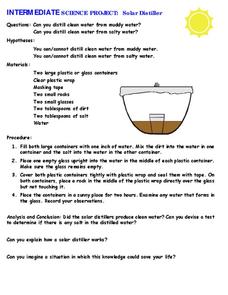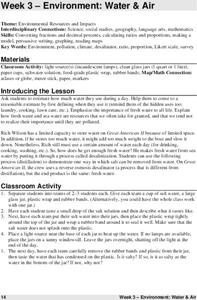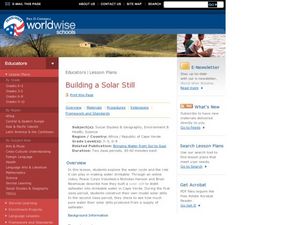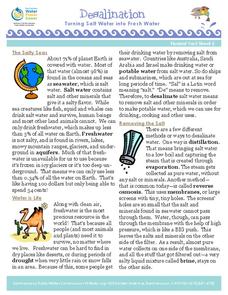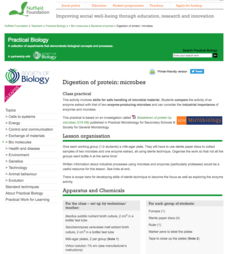University of Georgia
What's So Special about Bottled Drinking Water?
Is artesian water designed to be better, or is it just from wells similar to those in the city of Artesium? This experiment looks at many different types of bottled waters, including artesian. Using a soap mixture, scholars test to see...
US Department of Energy
Solar Distiller
Explore the sun's ability to distill contaminated water with this simple set of classroom experiments. After filling two glass bowls, one with muddy water and the other with salt water, they are covered with plastic wrap and placed in...
Curated OER
The Water Cycle
Observe the stages of the water cycle by completing 3 activities. To help understanding of the water cycle your students can observe evaporation, the formation of frost, vapor and water and the process of distillation which is used to...
Foundation for Water & Energy Education
What is the Water Cycle? Activity B
Curious physical scientists follow a lesson on the properties of water with this lesson on distillation. They observe a miniature water cycle model that filters dirty water into clean water. These two lessons combined are an enriching...
Curated OER
What is Water?
Young scholars examine water's properties. They participate in hands-on activities to show the properties of water.
DiscoverE
Water Pollution Cleanup
How do scientists determine the best method for removing pollutants from our water sources? Environmental scholars experiment with pollution clean-up options to discover which are the most cost-effective, fastest, and most thorough....
Curated OER
Pollution and Environmental Studies- Daily Water Use
In this environmental studies worksheet, students create a data table to discover how much water each person uses on a daily basis and what it is used for. They complete a post activity to make and test solutions for pollution using a...
Curated OER
Environment: Water & Air
The introduction to the lesson plan mentions a sailor's limited capacity to store drinking water on his ship. Pupils then set up an overnight experiment to remove freshwater from salt water by distillation. There is a math and map...
Salt River Project
How Do We Clean Polluted Water?
How do we clean up oil spills and other pollutants in the water? Explore water treatment strategies with a set of environmental science experiments. Groups remove oil from water, work with wastewater treatment, and perform a water...
Curated OER
Separation Techniques
Wow! Expose your chemistry class to every method of separating mixtures by showing this slide show. Learners will view diagrams and graphic organizers that support notes about filtration, chromatography, distillation, centrifugation, and...
Curated OER
The Effect of Dissolved Salt on the Boiling Point of Water
Explore the properties of solutions with a lab activity. Chemistry fans determine the boiling point of water, add salt to create a solution, and then repeat the process four more times. They design their own data table and then graph the...
Curated OER
The Sun as the Driving Force of the Water Cycle
Learners study the water cycle and how the sun is an important factor. In this water cycle lesson plan students investigate how to desalinate water and explore the different densities of fresh versus saltwater.
Curated OER
Water, Water Everywhere and Not a Drop to Drink
Students identify the different stages in the water cycle. In this environmental science lesson, students research about different water pollutants in watershed. They describe ways to purify water.
Curated OER
Water And Changes Of State (3.1)
In this reviewing water and changes of state worksheet, learners answer questions about water vapor, state of water, freezing point of ice, evaporation, condensation, distillation, dry ice, and the water cycle. Students answer...
Curated OER
Distillation
A sequence of slides that show the apparatus set up for varying practices of distillation. The equipment pieces in each diagram are labeled and their purpose noted. Your class can use these pictures to help set up their own equipment, or...
American Chemical Society
Changing State: Condensation
When you have a cold drink and you notice the water forming on the outside, it is literally pulling the water from the surrounding air to form the condensation. After watching a demonstration of condensation forming on a glass,...
Curated OER
Building A Solar Still
Students investigate the water cycle by viewing an online video. In this drinking water instructional activity, students create solar stills at their campus in order to purify water that is tainted. Students view a video on their...
Curated OER
Survival Still
Lead your class to construct a solar still on campus to demonstrate how water can be extracted from the soil. The power of solar energy is emphasized, as is the concept of how capillary water can be recovered and purified by using a...
San Francisco Public Utilities Commission
Desalination: Turning Salt Water into Fresh Water
How does San Francisco supply its citizens with enough water, even during a drought? Learn about reservoirs and why desalination could be a good solution with a reading passage about water conservation. After kids finish the...
Curated OER
Seashore Explorers
There are three separate lessons within this resource that can be used together, or that can each stand alone. In the first, five simple activities allow junior scientists to examine the amazing properties of water. In the second, they...
Curated OER
Condensation and the Water Cycle
Students explore the natural distallation process that occurs in the water cycle. They use plastic cups and cotton swabs to observe the condensation process that is evident in the water cycle.
Nuffield Foundation
Observing Osmosis, Plasmolysis, and Turgor in Plant Cells
Create the perfect conditions for osmosis. Young scholars use a microscope to observe plant cells exposed to distilled water or sodium chloride. They observe how osmosis creates turgid or plasmolyzed cells.
Nuffield Foundation
Digestion of Protein: Microbes
Milk the resource for all it's worth. Young biologists perform assay techniques to test the digestion of protein. They place bacterial samples, fungal samples, trypsin solution, and distilled water on a milk-agar plate to see the effects...
Nuffield Foundation
Digestion of Starch: Microbes
Sugar isn't good for you, but it's great for microbes. A simple experiment has pupils investigate the digestion of starch by microbes to produce sugars. They apply two bacterial cultures, an amylase solution, and distilled water on a...



